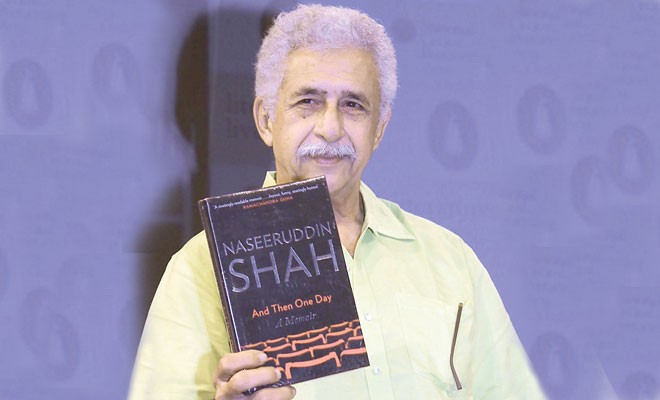
If you are only interested in reading Shah’s growth in Bollywood then the autobiography may not interest you

He is not just a Bollywood actor; in fact unlike his contemporaries he started his career as a theatre artist, has studied acting in the best schools of India and delved into Bollywood without severing ties with his founding father - theatre. Among his most notable works is the iconic TV series Mirza Ghalib that took the telly world by storm. So who is this guy after all and what made him the man he is? Naseeruddin Shah answers these questions and many more in his memoir And Then One Day where he discusses the first half of his life candidly, without mincing any words.
The book traces back Shah’s roots as a child born in Barabanki, who grew up to become one of the finest actors in India. He tells his readers that since he wasn’t the best looking guy in the class, nor the smartest; he was never selected for acting roles. In essence, the boy who would go on to become a leading actor wasn’t even good enough for a consideration. Nonetheless, Shah thanks his administrators at St. Joseph’s College for making him aware of English films that he was shown every week and that made him explore the actor inside. He also talks at length about his love for cricket (and posters); acting on stage and studies but films were the best things that happened to him in boarding school - till he failed in grade nine.
Reading Shah’s memoir is a different experience altogether for the reader can easily relate to his life’s incidents. For some the mere mention of R. L. Stevenson’s Treasure Island would be a delight, while for others the discussion of how to smoke without getting caught will spark memories. Shifting schools, however, was perhaps the most important turning point for Shah who managed to run away from the new place to make a career in Bombay. At that point, he only managed to get small parts in major films and after annoying the relatives of a friend’s girlfriend for a month, he literally had to spend time on the road until Dilip Kumar’s sister found him (on his father’s request) and sent him back. His career as an extra ended then and there.
The autobiography is glaringly truthful at times, from his first romantic encounter to the moment where he misses his father’s funeral and feels remorse for it. He doesn’t shy away from mentioning his family in detail and although his fans may have no interest in the family tree, the way it is described is not at all boring.
The book also sheds light on his struggling relationship with his father and his first marriage to a Pakistani national Purveen Morad who was 14 years elder to him.
This book is not a Memoir if you ask me; it is Shah’s interaction with his readers. He criticizes Sholay because he had seen all the films that combined to make the greatest film of all time; he doesn’t mention the names of many characters in the book like ‘R’ with whom he was having an extramarital affair and the writing duo who wanted him to work in their film rather than continue Albert Pinto Ko Ghussa Kyon Aata Hai; he criticizes the makers of Sunaina; confesses to forming Motley Productions because he wanted to play Hamlet; and even discusses his usage of Marijuana and LSD openly, something others would like to keep a secret. Add pictures to this truthful encounter and you get an autobiography that is worth reading and recommending.
On the whole, And Then One Day is a candid memoir of Shah’s entry into the world in general, and the world of entertainment in particular. If you are looking for his views on his iconic confrontation with Dilip Kumar in Subhash Ghai’s Karma, his explanation on doing action films like Hero Hiralal, Tridev etc, and his decision to do films in Pakistan and Hollywood, then this book is not for you. Here he only talks about the first 30 odd years of his life - both personal and professional. He takes 184 pages before talking about his foray into films … one hopes that he comes up with the sequel to this memoir soon so that his fans can know more about his films and his personality as a Bollywood actor.
5 things you didn’t know about Naseeruddin Shah till now…
1. ‑Shah writes that he was one of the contenders for the title role of Gandhi, which was eventually played by British actor Ben Kingsley. He was shortlisted by the director Richard Attenborough and went for an audition to England only to be rejected later.
2. ‑The actor wrote a letter to poet/director Gulzar in the ‘70s regarding the role of Mirza Ghalib; when the film was scrapped and made into a TV series. As for the letter, Gulzar never received it.
3. ‑Fellow actor Rajendra Jaspal stabbed him in a fit of murderous rage and Om Puri had to play saviour as he took the injured actor to the hospital.
4. ‑A riding accident ahead of Tughlaq helped Shah recuperate in time for Junoon where he was supposed to ride a horse. As luck would have it, Tughlaq never got made; Junoon made Shah a household name.
5. ‑The whole world may know that Shah was one of the many graduates from the famed Film and Television Institute of India (FTII). Not many know that he was one of the few students who instigated a hunger strike when students of the direction course were given a go-ahead to enlist actors from outside the Institute for their projects.